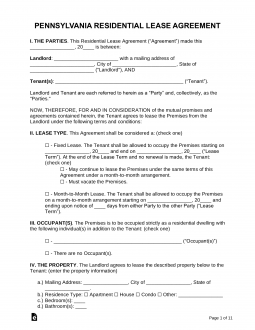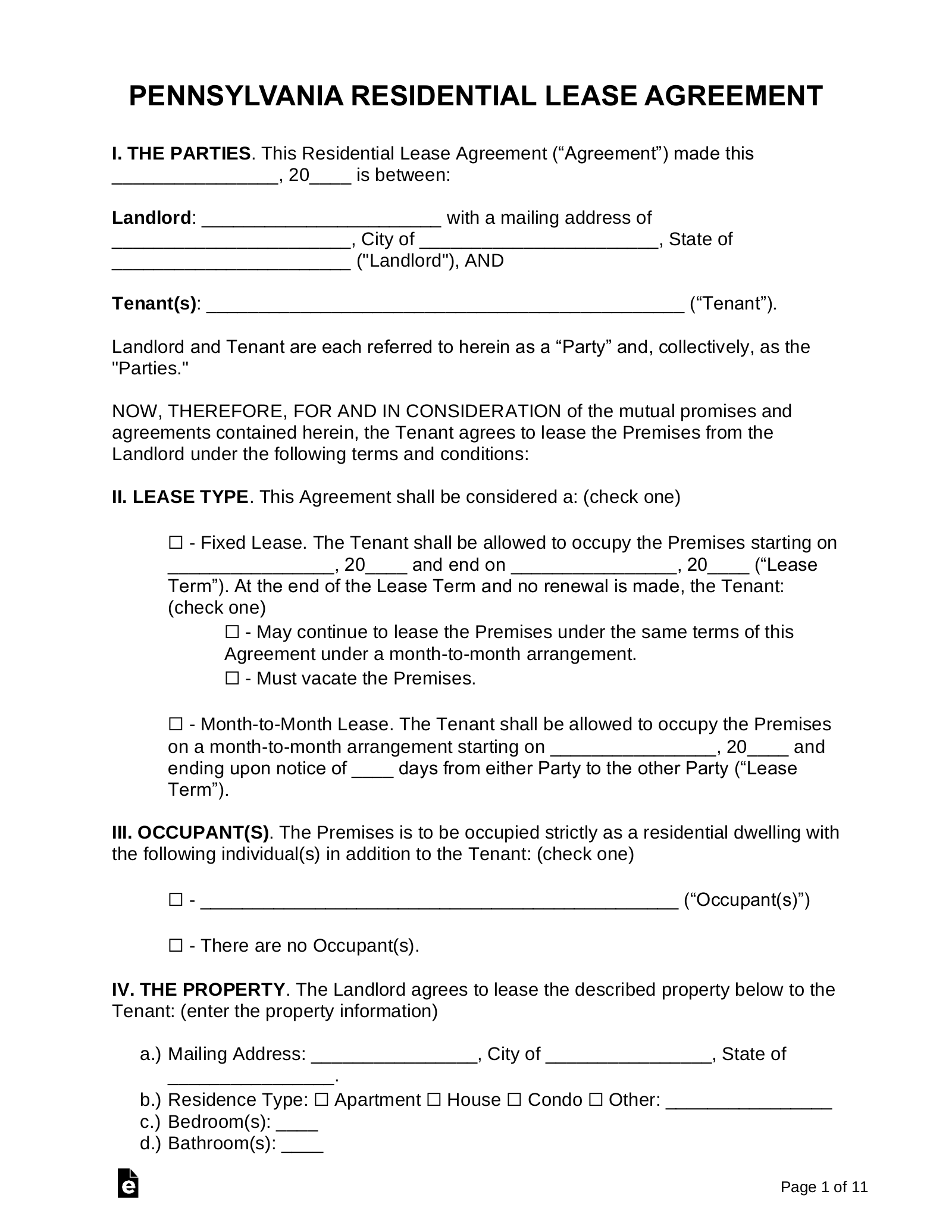Updated February 14, 2024
A Pennsylvania lease agreement allows landlords to rent property to tenants in exchange for payment. It is common practice for a landlord to verify a tenant’s income and employment before signing a lease to ensure that the tenant can afford the rent. The tenant may also be obligated to pay a security deposit and the first month’s rent.
Table of Contents |
Agreement Types (6)
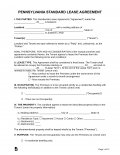 Standard Residential Lease Agreement – Usually written as a one-year arrangement but can be for any specified timeframe with a start and end date. Standard Residential Lease Agreement – Usually written as a one-year arrangement but can be for any specified timeframe with a start and end date.
Download: PDF, MS Word, OpenDocument |
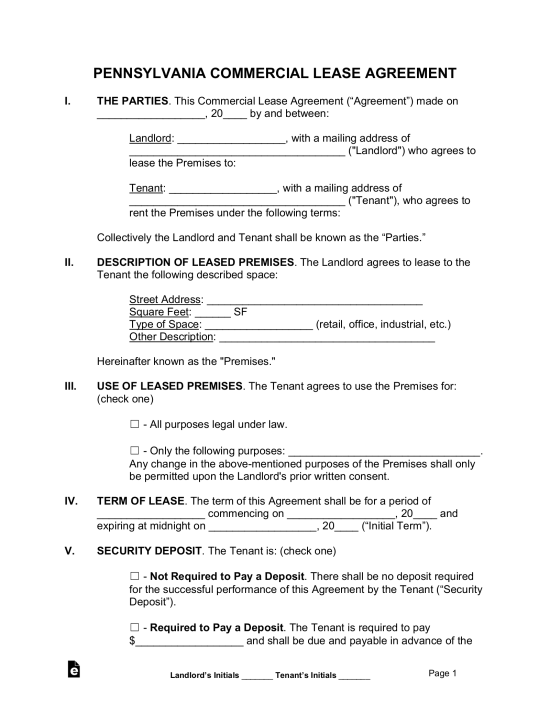 Commercial Lease Agreement – To be used for all business-related tenancies. Commercial Lease Agreement – To be used for all business-related tenancies.
Download: PDF, MS Word, OpenDocument |
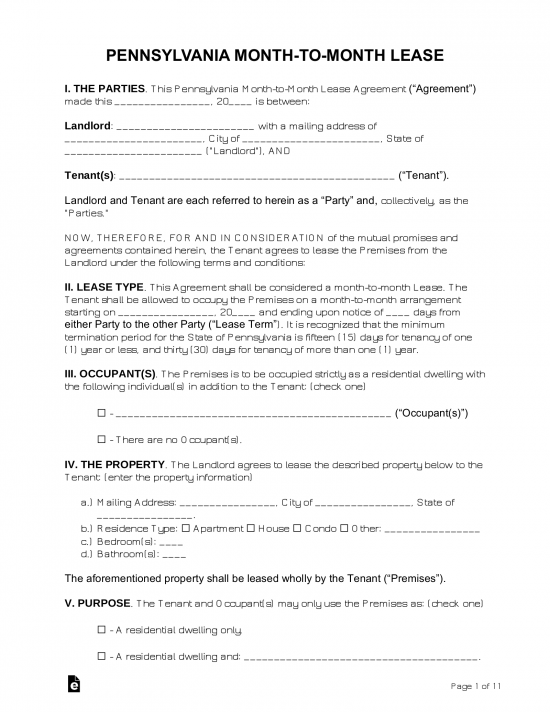 Month-to-Month Lease Agreement – Allows for the landlord or tenant to cancel within 15 days. If the tenancy has been ongoing for more than one year, the parties must give each other at least 30 days’ notice. Month-to-Month Lease Agreement – Allows for the landlord or tenant to cancel within 15 days. If the tenancy has been ongoing for more than one year, the parties must give each other at least 30 days’ notice.
Download: PDF, MS Word, OpenDocument |
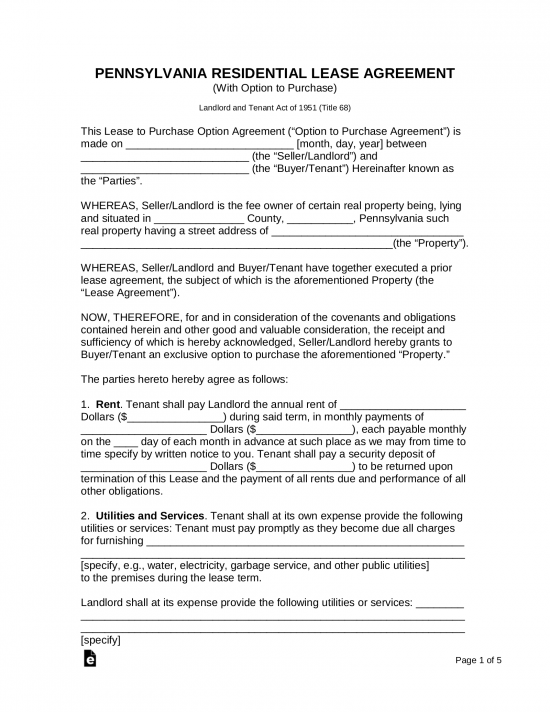 Rent-to-Own Lease Agreement – Standard residential contract that allows for the landlord and tenant to create a pre-determined agreement for the purchase and sale of the rental property. Rent-to-Own Lease Agreement – Standard residential contract that allows for the landlord and tenant to create a pre-determined agreement for the purchase and sale of the rental property.
Download: PDF, MS Word, OpenDocument |
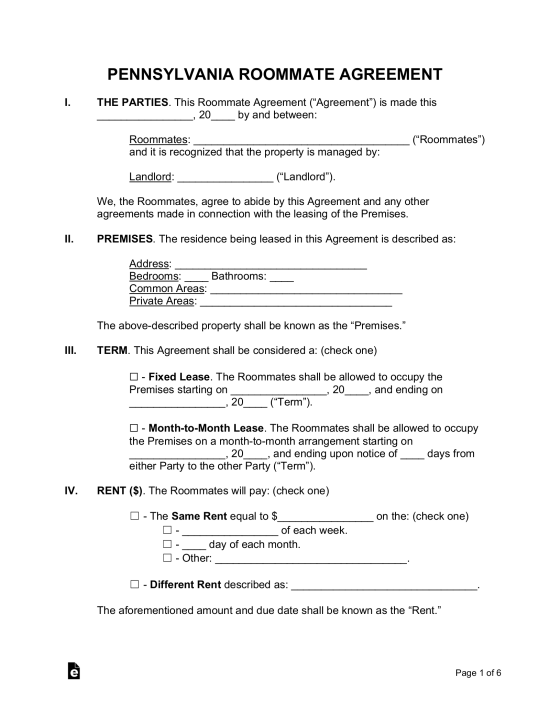 Room Rental (Roommate) Agreement – For the members of a home where each occupant is given a bedroom and the contract is for the shared common areas and expenses. Room Rental (Roommate) Agreement – For the members of a home where each occupant is given a bedroom and the contract is for the shared common areas and expenses.
Download: PDF |
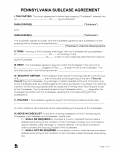 Sublease Agreement – For a tenant seeking to sublet space they have under lease from the landlord/agent. Sublease Agreement – For a tenant seeking to sublet space they have under lease from the landlord/agent.
Download: PDF |
Required Disclosures (2)
- Lead-Based Paint Disclosure – For a housing structure built prior to 1978, the landlord must inform the tenant of the possible existence of lead-based paint in the dwelling. Both the landlord and tenant must sign this disclosure.
- Security Deposit Receipt – The landlord must provide the tenant with a written receipt for any security deposit placed in an escrow account. This receipt must state the name and address of the institution where the deposit is being held.[1]
Security Deposits
Maximum Amount – The landlord may not ask for more than two months’ rent for a security deposit during the first year of a lease.[2] During the second or subsequent years of a lease, the landlord may not ask for more than one month’s rent.[3]
Collecting Interest – Any security deposit over $100 that has been held in escrow for more than two years must be placed in an interest-bearing account, with interest paid out annually to the tenant.[4]
Receipt – If the landlord is required to place the security deposit in an escrow account, interest-bearing or otherwise, they must provide a written receipt to the tenant disclosing the name and address of the institution housing the deposit.[1]
Returning – The landlord must return the balance of the security deposit and any accumulated interest to the tenant within 30 days of the lease termination date.[5]
- Itemized List – Within 30 days of the end of the lease term, the landlord must provide the tenant with a written list of any damages to the property to which portions of the security deposit have been applied.[5]
When is Rent Due?
Grace Period – There is no statutory grace period in Pennsylvania. If rent is not paid on the due date established in the lease agreement, the landlord can send a 10-day notice to quit.[6]
Maximum Late Fee – There is no state law that sets an upper limit on the amount a landlord can charge for a late fee.
NSF Fee – $50 is the maximum fee a landlord can charge for a bad check.[7]
Withholding Rent – While there is no statewide statute on the tenant’s right to withhold rent, Pennsylvania case law gives tenants the implied right to repair a defect impacting the habitability of the property and deduct the cost of the repairs from their rent.[8]
Right to Enter (Landlord)
There are no statewide statutes governing a landlord’s right to entry in Pennsylvania. Nevertheless, it is recommended that the landlord give written notice at least one day prior to entering the property.
Abandonment
Absence – Pennsylvania state law does not establish a set length of time that a tenant must be absent for a rental property to be deemed abandoned.
Breaking the Lease – Under Pennsylvania’s Implied Warrant of Habitability, if the landlord fails to maintain the rental unit in a fit and habitable condition, the tenant may have the legal right to terminate the lease without penalty.[8]
Tenant’s Utility Shutoff – If the tenant’s failure to maintain utilities constitutes a breach of the conditions of the lease, the landlord may serve a 15- or 30-day notice to vacate, depending on the length of the lease term.[6]
Unclaimed Property – If a tenant leaves personal property on the premises, the landlord must store it and send a written notice stating that the tenant must respond or retrieve the property within 10 days. In responding to the notice, the tenant may request that the landlord store the property for 30 days from the date of the notice.[9]

